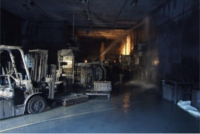Tuesday, February 7, 2012, marked the fourth anniversary of the massive sugar dust explosion that killed 14 workers and injured 38 others at the Imperial Sugar Refinery in Port Wentworth, Georgia.
The Chemical Safety Board marked the occasion by issuing this press statement from Chairman Rafael Moure-Eraso:
“CSB board members and investigation staff keep the memory of this tragedy close to us as we continue to advocate for changes in national workplace rules aimed at preventing such accidents in the future. We believe the safety recommendations that followed from our investigation of this accident will go far in saving lives. I am pleased to report that on this accident anniversary all but one of our recommendations have been successfully adopted by their recipients.
“Specifically, the CSB called on the Occupational Safety and Health Administration, OSHA, to “proceed expeditiously” on our 2006 recommendation that OSHA promulgate a new combustible dust standard for general industry. We believe such a standard is necessary to reduce or eliminate hazards from fires and explosions from a wide variety of combustible powders and dust.
“I am disappointed that OSHA has not moved forward on this recommendation. Completing a comprehensive OSHA dust standard is the major piece of unfinished business from the Imperial Sugar tragedy.
“The CSB’s report into the accident was issued at a public meeting in Savannah, Georgia, in September of 2009. It concluded that Imperial Sugar had inadequately designed and maintained dust collection and sugar handling equipment and that inadequate housekeeping practices allowed highly combustible sugar dust and granulated sugar to accumulate to explosive concentrations throughout the refinery’s packing buildings.
“It is gratifying to be able to report that during 2011 the CSB designated Imperial Sugar’s responses to all five of our safety recommendations to the company as “Closed-Acceptable Action.” Specifically, the CSB recommended that Imperial Sugar develop a corporate-wide comprehensive program to control combustible dust accumulation, develop training materials that address combustible dust hazards and train all employees and contractors, and improve its evacuation procedures. We recommended Imperial Sugar comply with the National Fire Protection Association’s (NFPA) recommended practices for preventing dust fires and explosions, and urged the company to conduct a comprehensive review of all of its manufacturing facilities’ adherence to NFPA standards.
“We recently received notice from Imperial Sugar’s property insurer, Zurich Services Corporation, that it is providing its risk engineers ongoing training in the hazards of combustible dusts, which we recommended. This will help ensure that hazards are identified during insurance inspections so that the companies can eliminate or reduce the hazard before a catastrophic accident occurs. Additionally a series of safety recommendations to AIB International and the American Bakers Association -- to develop combustible dust training and auditing materials -- also have all been given a status of ‘Closed-Acceptable Action.’
“’Closed-Acceptable Action’ means that the recipients have effectively implemented the safety changes requested by the board, and I commend them for taking these important recommendations seriously.
“The CSB recently reissued our call for a dust standard with our investigation into three flash fires that occurred in a series of accidents at the Hoeganaes Corporation iron powder processing plant in Gallatin, Tennessee, taking five lives. Indeed, OSHA lowered the CSB recommendation’s priority on its regulatory agenda in recent weeks.
“I continue to advocate for a comprehensive combustible dust standard, and encourage industry’s support. Preventing dust explosions is a necessary investment: prevention saves lives and massive property losses. It is my view that a comprehensive standard will save lives and prevent future combustible dust fatalities.”






